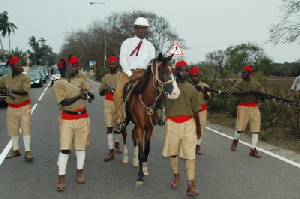Accra, Feb 28, GNA - Wreaths were laid at the Osu Cenotaph on Tuesday in commemoration of the 59th anniversary of the three ex-servicemen who were gunned down at the Christianborg Crossroads on February 28, 1948, while going to present a petition to the British Colonial Governor, Sir Gerald Creasy.
They were Sergeant Adjetey, Corporal Attipoe and Private Odartey Lamptey, all members of the Gold Coast Regiment of the Royal West African Frontier Force that fought alongside the allied forces during the Second World War.
The Colonialists had demobilised them promising to resettle them but had reneged. Dr Kwame Addo Kufuor, Minister of Defence, laid a wreath on behalf of the government and people of Ghana and Lt-Gen J.B. Danquah, the Chief of Defence Staff, laid one on behalf of the security services. The Chairman of the Veterans Association of Ghana, Air Vice Marshal Odartey Barnor laid one on behalf of the veterans while Nii Adote Obuor, Sempe Mantse and President of Ga Traditional Council, laid one on behalf of traditional rulers. About 155 men drawn from the Army, Air Force, Navy, the Police and the Veteran Soldiers mounted a parade, which was witnessed by a large crowd.Special prayers were said for the love, dedication and the service the three soldiers rendered to the country. Major D. B. Bangsiibu, Chaplain of the Ghana Armed Forces thanked God for sustaining the country since the colonial era and prayed for peace and stability in Ghana and in the world. Major U. S. Ahmed, an Imam of the GAF also prayed for sustenance of peace and stability. The Osu Wulomo, poured the libation. Before the commencement of the ceremony, a thrilling enactment of the incident was performed by the Actors Guild to a wild and ecstatic crowd that had gathered at the fringes of the Cenotaph to observe the goings-on. This year's remembrance celebration witnessed an unusually large crowd compared to previous events that were very low-keyed. Relatives of the fallen heroes, Ministers, parliamentarians as well as other important dignities graced the occasion.
On Saturday, February 28, 1948, a number of ex-servicemen were marching from Accra to Christianborg Castle to present a petition to the Governor on their unpaid war benefits when they were intercepted at the crossroads by a contingent of armed policemen.
The contingent led by British Superintendent Mr Imray ordered that they dispersed and when they refused to obey, he gave an order to the police to open fire and the three ex-servicemen were killed. The ex-soldiers had fought alongside the allied forces in the Gold Coast Regiment of the Royal West African Frontier Force during the Second World War and had returned home poor and were not paid their gratuities.
After several appeals to the colonial government to consider their plight had failed, the ex-servicemen decided that a direct approach should be made to the British Colonial Governor of the Gold Coast.
News about the death of the servicemen spread rapidly, leading to a situation where law and order broke down in Accra and other parts of the country.
It encouraged anti-colonial movements to press the British government to institute a committee to investigate the killings and general disorder.
The Committee recommended self-government for the Gold Coast, which subsequently led to the attainment of political independence for the country.

















